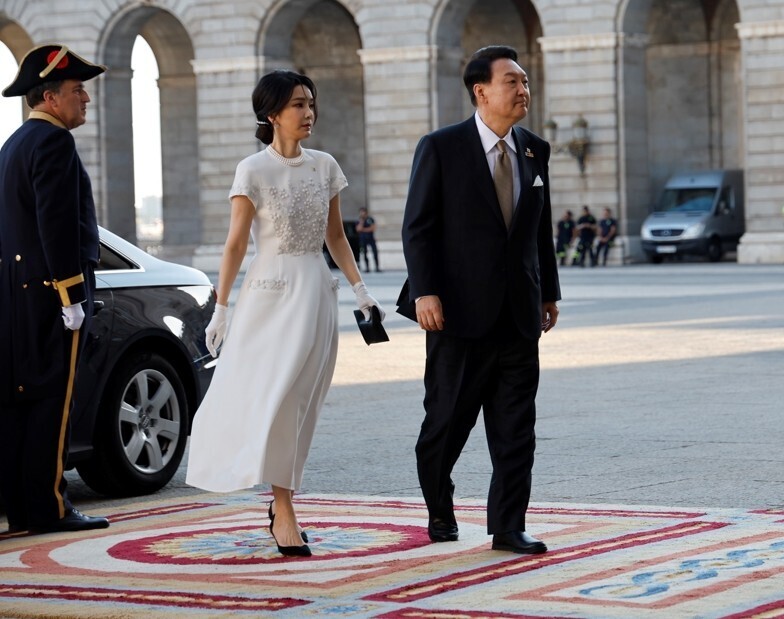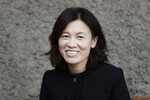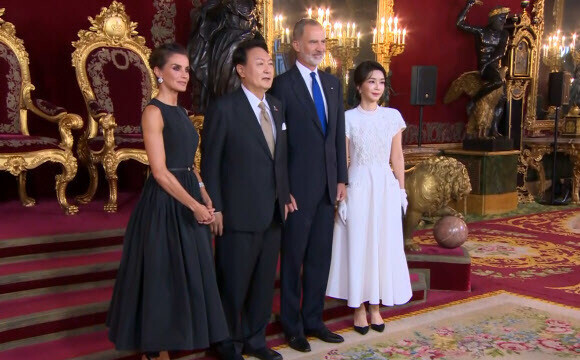hankyoreh
Links to other country sites 다른 나라 사이트 링크
[Column] Yoon Suk-yeol’s scandal-burdened foreign policy


Why didn’t the wife of Japanese Prime Minister Fumio Kishida attend the NATO summit? The question had been on my mind, so I asked a Seoul correspondent from the Japanese media.
“The upper house election was approaching, with multiple serious situations at hand, so the media seemed to naturally assume that she wouldn’t be going,” they responded. “She’s not really the type to make much noise in the press.”
This was a security-related summit, not even a state visit, so it appeared only natural that Kishida’s wife would not accompany him. Instead, Kishida seemed focused on the agenda of the summit.
On the other hand, the multilateral diplomacy debut of President Yoon Suk-yeol, who surely wanted to be remembered in history as the first Korean president to be invited to a NATO summit, is now being remembered for the numerous controversies surrounding his wife Kim Keon-hee and her activities during the summit.
Discussions of what it means that four Asian countries were present when NATO characterized China as a “structural challenge” for the first time in its 70-year history were overshadowed by gossip. There hasn’t even been ample debate about such a move’s pros and cons, or what Korea should be preparing for as its next steps.
Yoon will likely feel wronged. He may scold presidential office officials for their incompetence at PR spin or blame the opposition for launching unreasonable attacks against him.
However, recent polls show that Koreans’ approval of the president and his performance has plummeted to around the 30 percent range, confirming that the majority of the public did not approve of the way Yoon handled the NATO summit.
What exactly is Yoon’s foreign policy strategy? Yoon’s foreign policy vision can be summarized as strengthening the Korea-US alliance, improving Korea-Japan relations, and bolstering Korea’s role on the global stage.
The problem is that Yoon isn’t exactly inspiring confidence about whether he came to such a foreign policy stance after deeply contemplating the grim reality that South Korea faces today or whether he’s carefully conducting diplomacy in our current unprecedentedly thorny and complex international environment.
Rather, it seems that the Yoon administration chose to adopt a foreign policy line that was in complete opposition to that of its predecessor, simply in order to label that predecessor as “pro-China,” “subservient to North Korea,” and “anti-Japan.”
Yoon’s attitude that he can quickly and easily accomplish the foreign policy goals which the previous government failed to, is not only wishful thinking — it’s risky too.
Yoon wants to improve relations with Japan to show how much he’s accomplished. His administration expects that by rapidly improving Korea-Japan relations, thereby enabling close cooperation among South Korea, the US, and Japan in the areas of politics, military, economy and the international order, other issues will sort themselves out as well.
Ahead of the Korea-US-Japan trilateral summit held on the sidelines of the NATO summit, Yoon said, “I look forward to today’s meeting as an opportunity for Korea-US-Japan cooperation to establish itself as a crucial central axis of world peace and stability.” He sent a similar message on Tuesday when he visited a memorial for the late former Japanese prime minister, Shinzo Abe.

Considering Yoon sent a special delegation to Japan back when he was president-elect to show his will to be “different from the Moon Jae-in administration,” it is likely that he expected a Korea-Japan summit would soon materialize and the two neighbors would easily work things out as soon as he took office.
However, the Japanese government’s position is that there will be no improvement in relations unless the Korean government comes up with a way to stop the forced liquidation of seized Japanese corporate assets in relation to the South Korean Supreme Court’s decision on forced labor by Japan.
It is a positive sign that, since July 4, the South Korean government has been operating a joint public-private council to come up with solutions for the victims of forced labor, gathering opinions from victims and seeking remedies. The government is even discussing a plan in which the Korean government first compensates the victims and then receives reimbursement from a fund in which the Japanese side also pitches in.
Considering the nearing liquidation deadline, Korea shouldn’t by no means be kicking its heels. But even in a hurry, we should not undermine our principles and the historical significance of this case. Neither victims nor the domestic public opinion will accept any outcome that does not include an apology from Japanese companies and their participation in compensation.
The Japanese side, however, is said to be most interested in the question of whether the administration in Korea can persuade domestic public opinion. This is because even if the South Korean and Japanese governments reach an agreement, if the South Korean government does not get the consent of the victims and the Korean public, it will only end up making things worse.
However, in a situation in which president Yoon’s approval rating is plunging while he publicly maintains an air of indifference, it’s difficult to imagine Japan engaging in negotiations.
In the end, neither Korea’s relations with Japan nor its foreign policy can be separated from their roots in domestic politics.
With the death of Abe and the landslide victory of his Liberal Democratic Party (LDP) in Japan’s recent upper house elections, the move to change Article 9 — the core of the so-called peace constitution — to specify the grounds for the existence of Japan’s Self-Defense Forces and to increase the country’s arms buildup is certainly worrisome. All these issues are casting a dark shadow over Korea-Japan relations.
However, the power of Japanese citizens, who have persistently abided by the peace constitution, remains an important variable.
It is also important to remember Prime Minister Fumio Kishida’s original policy lines. Kishida is the leader of Kochikai, a moderate faction within the LDP that has long held a more dovish foreign policy stance. The Japanese prime minister’s constituency is also Hiroshima, a city well versed in what war can entail.
Kishida’s original political lines centered around prioritizing the economy, no aggressive military buildup, emphasis on relations with Asian neighbors, and denuclearization. His “new capitalism” vision, which rejects market omnipotence and looks to raise workers’ wages and increase distribution, is also noteworthy.
On the other hand, Yoon’s drive for people’s livelihoods, with its emphasis only on the market’s free reign, is empty and without roots.
Even when it comes to Korea-Japan relations, we need to put aside our impatience and try to improve the relationship properly, clarifying what lines we will not cross regarding the complicated history of Korea and Japan and making an effort to gain public consensus.
A foreign policy that aims to show that the former administration was “guilty” and a politics that exploits investigations and other familiar tactics to Yoon to escape crises will further damage Korea’s domestic politics and its foreign policy.
While Yoon may have become president by conducting investigations, he certainly cannot govern through them.
Please direct questions or comments to [english@hani.co.kr]

Editorial・opinion
![[Editorial] Yoon must halt procurement of SM-3 interceptor missiles [Editorial] Yoon must halt procurement of SM-3 interceptor missiles](https://flexible.img.hani.co.kr/flexible/normal/500/300/imgdb/child/2024/0501/17145495551605_1717145495195344.jpg) [Editorial] Yoon must halt procurement of SM-3 interceptor missiles
[Editorial] Yoon must halt procurement of SM-3 interceptor missiles![[Guest essay] Maybe Korea’s rapid population decline is an opportunity, not a crisis [Guest essay] Maybe Korea’s rapid population decline is an opportunity, not a crisis](https://flexible.img.hani.co.kr/flexible/normal/500/300/imgdb/original/2024/0430/9417144634983596.jpg) [Guest essay] Maybe Korea’s rapid population decline is an opportunity, not a crisis
[Guest essay] Maybe Korea’s rapid population decline is an opportunity, not a crisis- [Column] Can Yoon steer diplomacy with Russia, China back on track?
- [Column] Season 2 of special prosecutor probe may be coming to Korea soon
- [Column] Park Geun-hye déjà vu in Yoon Suk-yeol
- [Editorial] New weight of N. Korea’s nuclear threats makes dialogue all the more urgent
- [Guest essay] The real reason Korea’s new right wants to dub Rhee a founding father
- [Column] ‘Choson’: Is it time we start referring to N. Korea in its own terms?
- [Editorial] Japan’s rewriting of history with Korea has gone too far
- [Column] The president’s questionable capacity for dialogue
Most viewed articles
- 1Months and months of overdue wages are pushing migrant workers in Korea into debt
- 2At heart of West’s handwringing over Chinese ‘overcapacity,’ a battle to lead key future industries
- 3[Editorial] Yoon must halt procurement of SM-3 interceptor missiles
- 4Fruitless Yoon-Lee summit inflames partisan tensions in Korea
- 5Trump asks why US would defend Korea, hints at hiking Seoul’s defense cost burden
- 6Dermatology, plastic surgery drove record medical tourism to Korea in 2023
- 71 in 3 S. Korean security experts support nuclear armament, CSIS finds
- 8[Editorial] New weight of N. Korea’s nuclear threats makes dialogue all the more urgent
- 9South Korea officially an aged society just 17 years after becoming aging society
- 10[Column] For K-pop idols, is all love forbidden love?